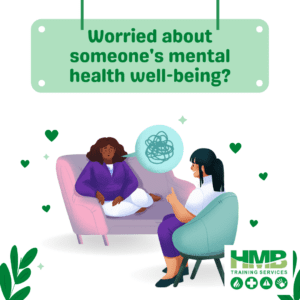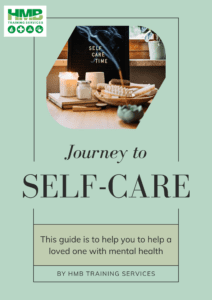Mental Health – What Is It?
Sometimes we struggle, here we discuss the top strategies to help yourself and those who are not feeling mentally well. Mental health is a crucial component of our overall well-being, yet it is often overlooked or stigmatised in the way we live. According to the World Health Organisation, 1 in 4 people globally will experience a mental health issue at some point in their lives. Despite this high prevalence, many people still feel ashamed or embarrassed to seek help, which can lead to worsening symptoms and decreased quality of life.
It’s essential to understand mental health, including common issues and symptoms, so that we can recognise when someone we know may be struggling and provide appropriate support. In this section, you will know the top strategies to help yourself and those who are not feeling mentally well, we’ll provide an overview of mental health and some of the most common issues people face. We’ll also discuss the physical symptoms of poor mental health and the stigmas and misconceptions that can prevent people from seeking help. By the end of this section, you’ll have a better understanding of mental health and how it affects those around us.
Mental Health Overview
Mental health refers to a person’s emotional, psychological, and social well-being. It affects how we think, feel, and behave in our daily lives. Just like physical health, mental health is a critical aspect of our overall well-being and impacts our ability to lead fulfilling and productive lives. Good mental health allows us to manage stress, form healthy relationships, and make positive contributions to society.
Mental health issues can range from mild to severe and can affect anyone regardless of age, gender, or background. According to the National Institute of Mental Health (NIMH), some of the most common mental health issues include anxiety disorders, mood disorders (such as depression and bipolar disorder), psychotic disorders (such as schizophrenia), and eating disorders.
Common Mental Health Issues
Each mental health issue has unique symptoms and characteristics. Here’s an overview of some of the most common issues:
- Anxiety disorders: People with anxiety disorders may experience excessive worry or fear, even in situations where there is no real danger. Physical symptoms may include sweating, trembling, or a racing heartbeat.
- Depression: Depression is characterised by feelings of sadness, hopelessness, and a lack of interest in activities that were once enjoyable. Physical symptoms may include fatigue, changes in appetite or sleep patterns, and difficulty concentrating.
- Bipolar disorder: Bipolar disorder involves alternating periods of depression and mania, which is characterised by feelings of euphoria, racing thoughts, and impulsive behaviour.
- Schizophrenia: Schizophrenia is a severe mental illness that affects a person’s ability to think, feel, and behave clearly. Symptoms may include hallucinations, delusions, and disordered thinking.
- Eating disorders: Eating disorders involve distorted thinking and behaviour related to food, weight, and body image. Common eating disorders include anorexia nervosa, bulimia nervosa, and binge-eating disorder.
Physical Symptoms of Poor Mental Health
In addition to emotional and psychological symptoms, poor mental health can manifest physically. For example, people with anxiety disorders may experience frequent headaches, digestive issues, or muscle tension. Similarly, people with depression may experience fatigue, changes in appetite or sleep patterns, and chronic pain.
Other symptoms could include; changes in appetite or weight, muscle tension or stiffness, aches and pains and in some cases, mental health conditions can also increase the risk of developing other health problems, such as heart disease or diabetes.
It’s essential to recognise these physical symptoms and consider them alongside emotional symptoms when assessing someone’s mental health.
It’s important to recognise that physical symptoms alone are not enough to diagnose a mental health condition, and many physical symptoms can have other causes. However, if you or a loved one are experiencing physical symptoms in addition to emotional or behavioural symptoms, it may be a good idea to seek evaluation from a mental health professional. A qualified mental health professional can help you determine the underlying cause of your symptoms and develop an appropriate treatment plan.
Stigma and Misconceptions
Despite the prevalence of mental health issues, many people still feel stigmatised or ashamed to seek help. This stigma can prevent people from getting the support they need to manage their symptoms effectively.
Common misconceptions about mental health issues include:
- Mental health issues are a sign of weakness.
- People with mental health issues should just “snap out of it.”
- Mental health issues are caused by personal failings or bad choices.
- Seeking help for mental health issues is a sign of weakness.
It’s crucial to combat these stigmas and misconceptions by educating ourselves and others about mental health and encouraging people to seek help when they need it.
Conclusion
In this section, we’ve provided an overview of mental health and some of the most common issues people face. We’ve also discussed physical symptoms of poor mental health and the stigmas and misconceptions that can prevent people from seeking help. By understanding mental health, we can better recognise when someone we know may be struggling and provide appropriate support. In the next section, we’ll discuss mental health first aid and how to respond to a crisis.
Read on to know the top strategies to help yourself and those who are not feeling mentally well.
Mental Health First Aid and Crisis Response
Mental health first aid is a set of skills and strategies used to help someone who is experiencing a mental health crisis. Just like physical first aid, mental health first aid is intended to provide initial support until professional help is available.
Here are some steps to take when responding to a mental health crisis:
- Assess the situation: Determine whether the person is in immediate danger and whether emergency services are needed.
- Listen non-judgmentally: Provide a safe and supportive environment for the person to talk about their feelings and concerns. Avoid offering unsolicited advice or dismissing their emotions.
- Give reassurance and information: Offer reassurance that help is available and provide information about local resources, such as crisis hotlines or mental health professionals.
- Encourage self-help and other support strategies: Encourage the person to engage in self-care activities, such as exercise, mindfulness, or hobbies. Encourage them to seek support from friends, family, or mental health professionals.
- Encourage professional help: If the person is in crisis, encourage them to seek professional help from a mental health provider or emergency services.
It’s essential to approach mental health first aid with empathy, compassion, and a non-judgmental attitude. With proper training and practice, anyone can learn to provide effective support to someone in crisis.
Self-Care Strategies for Supporting Mental Health
Supporting someone with poor mental health can be emotionally challenging and can take a toll on your own well-being. It’s crucial to prioritise self-care strategies to maintain your own mental health and well-being while supporting others.
Here are some self-care strategies you can try:
- Set boundaries: Establish clear boundaries around your time, energy, and emotional capacity. Know when to say no and prioritise your own needs.
- Practice self-compassion: Treat yourself with the same kindness and understanding that you would offer to a loved one.
- Engage in stress-reducing activities: Activities like exercise, mindfulness meditation, or creative hobbies can help reduce stress and improve your mood.
- Seek support: Don’t hesitate to seek support from friends, family, or mental health professionals. It’s essential to have a support system to turn to when you need it.
Download our self-care guide here.
Conclusion
Supporting someone with poor mental health can be challenging, but it’s a critical way to help our loved ones lead fulfilling and productive lives. By understanding common mental health issues, recognising physical and emotional symptoms, and knowing how to provide mental health first aid, we can offer effective support to those in crisis. Remember to prioritise your own mental health and well-being by practicing self-care strategies and seeking support when needed. Also, know the top strategies to help yourself and those who are not feeling mentally well.
Common Mental Health Issues and Symptoms
Mental health issues can manifest in many different ways, and the symptoms can vary widely depending on the individual and the condition. Here are a few common mental health issues and their associated symptoms:
- Depression: A persistent feeling of sadness or hopelessness, loss of interest in activities once enjoyed, changes in appetite or sleep patterns, and difficulty concentrating.
Example: If you notice that your friend has been cancelling plans, seems more withdrawn than usual, and is not interested in activities that they used to enjoy, they may be struggling with depression.
- Anxiety: Excessive worry or fear, restlessness or irritability, difficulty sleeping, and physical symptoms like sweating or trembling.
Example: If your partner is feeling nervous about an upcoming job interview, they may experience symptoms of anxiety, such as difficulty sleeping or an upset stomach.
- Bipolar disorder: Extreme mood swings between manic episodes (elevated mood, increased energy, and reckless behaviour) and depressive episodes (low mood, loss of interest in activities, and changes in appetite or sleep patterns).
Example: If your sibling has experienced periods of intense energy, racing thoughts, and impulsive behaviour, followed by periods of sadness and lack of energy, they may have bipolar disorder.
Top Strategies to Help Yourself and Those Who Are Not Feeling Mentally Well
If you suspect that a loved one is struggling with poor mental health, there are several ways you can offer support:
- Express concern and offer help: Let your loved one know that you care about them and are available to help in any way you can.
Example: You could say something like, “I’ve noticed that you’ve seemed down lately, and I’m here to support you in any way I can. Do you want to talk about what’s been going on?”
- Listen actively and non-judgmentally: Allow your loved one to express their thoughts and feelings without interrupting or offering unsolicited advice.
Example: You could say, “I’m here to listen whenever you want to talk. I won’t judge you, and I’ll keep what you say confidential.”
- Educate yourself about their condition: Learn more about their condition and how it can affect their life.
Example: You could read articles or books about depression or anxiety to better understand what your loved one is going through.
- Encourage professional help: Suggest that your loved one seek professional help from a mental health provider.
Example: You could say, “I think it would be helpful for you to talk to a therapist about what you’re going through. I can help you find someone if you’d like.” Or “I think it would be helpful to speak to a Doctor, I can make the appointment and sit with you.”
- Offer practical support: Offer to help with practical tasks, such as grocery shopping or childcare, to alleviate some of the stress your loved one may be feeling.
Example: You could say, “I know you’re going through a tough time right now. Can I help you with anything, like picking up groceries or watching the kids?”
By offering support and encouragement, you can help your loved one navigate their mental health struggles and work towards recovery.
Self-Care for Those Supporting Poor Mental Health
Supporting a loved one with poor mental health can be emotionally draining and stressful. It’s essential to prioritise self-care strategies to maintain your own mental health and well-being while supporting others. Here are some additional self-care strategies to consider:
- Practice good sleep hygiene: Getting enough sleep is essential for mental and physical health. Make sure you’re getting at least 7-8 hours of sleep each night and avoid caffeine or other stimulants before bed.
- Connect with others: Make time to connect with friends or family members who are supportive and understanding.
- Seek professional help if necessary: If you’re feeling overwhelmed or struggling to cope with the stress of supporting a loved one with poor mental health, consider seeking help from a mental health professional.
- Take breaks and prioritise leisure activities: Make time for hobbies or activities that you enjoy and that help you relax.
- Practice mindfulness or meditation: Mindfulness and meditation techniques can help reduce stress and improve overall well-being.
By prioritising self-care, you can ensure that you’re in the best possible position to support your loved one with poor mental health.
Download our self-care guide here.
Conclusion – Top Strategies to Help Yourself and Those Who are not Feeling Mentally Well
Supporting a loved one with poor mental health can be challenging, but it’s essential to offer support and encouragement during difficult times. By educating yourself about common mental health issues, offering practical support, and prioritising self-care, you can help your loved one navigate their struggles and work towards recovery. Know the top strategies to help yourself and those who are not feeling mentally well. Remember, taking care of your own mental health is just as important as supporting others, so make sure to prioritise self-care and seek help if necessary.

Download our
self-care guide
Further Training At HMB Training Services
Our mental health first aid courses are ran by a team of trainers; Heather and Mathew where they include stories of others and their own experiences. Bringing real life scenarios to the classroom not only enhances learning but understand what people may go through in their day-to-day lives. HMB Training Services are passionate in saving lives and spreading the awareness of Mental Health within our mental health first aid courses. In England, 1 in 6 people report experiencing a common mental health problem (such as anxiety and depression) in any given week.
What is included in out Mental Health Courses
Our courses are structured into modules, discussions and videos. Our three levelled courses (level 1 , level 2 and level 3) start with introduction into mental health first aid including the relevance into first aid elements. Understanding the impact of mental health problems from; day-to-day, physical health, work and education. You will understand the effects of stigma associated with mental illness and know how to cope. Knowing mental health on a continuum with being diagnosed and un-diagnosed. Understanding the risk factors, just like our cake analogy, and when early warning signs of mental health is becoming a problem. On our level one course you will understand how to start a difficult conversation. On our level two and three course you will have the opportunity to make these conversations through our role play activity. Know when and how to make a call especially if you believe the person is in a state of crisis.
All of our levelled courses include: Stress, Depression, Anxiety, Psychosis, Eating Disorders, Self-harm and Suicide.
Level two course includes Drugs and Alcohol, Self-medicating, additional signposting, and first aid plan – role play activity, Mental Health in the Workplace and the Five Steps to Mental Well-Being.
Level three course includes all of level two as above and: Personality Disorders, Bipolar Disorder, Schizophrenia, Post-Traumatic Stress Disorder and more in depth in each condition on how to sign post and get further help.
Why become trained in Mental Health First Aid?
Attending a mental health course will help you to realise just how widespread the problem can be for individuals who are affected by poor mental health, as well as create a new perspective on all of the ways it can affect their lives. Knowing more about poor mental will not only reduce stigma but get people talking without judgement. Talking more reduces the signs and symptoms but reduces the chances of mental health becoming a diagnosable mental health illness.
We have courses online delivered via zoom, or in our classroom at Brownhills. If you have a group of staff need training to become Mental Health First Aiders we can come to your classroom on site.
To view our open courses please click here; Mental Health First Aid
Contact us
Call us on 01543 453338 or email at info@hmbtrainingservices.co.uk



